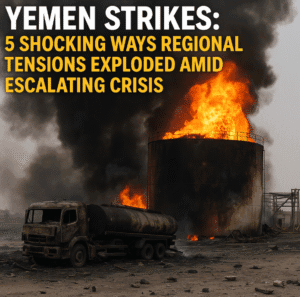Yemen Strikes: 5 Shocking Ways Regional Tensions Exploded Amid Escalating Crisis
Israeli forces struck Houthi-controlled Hodeidah, Yemen, on July 25, 2024, hitting an oil storage facility and igniting fires visible across the port city. The attack followed evacuation warnings to residents near strategic ports—Hodeidah, Ras Isa, and Salif—accused by Israel of facilitating weapons transfers by the Iranian-backed Houthis. The group, which governs northern Yemen, has intensified missile and drone attacks on Israeli-linked ships and territories, framing its actions as resistance to Israel’s war in Gaza.
Hodeidah’s port, a lifeline for 70% of Yemen’s imports, now faces heightened risks of disruption, threatening to deepen one of the world’s worst humanitarian crises. The strikes preceded a stalled U.S.-Omani ceasefire proposal, reflecting failed diplomacy as regional proxy conflicts flare. With Iran’s support, the Houthis continue destabilizing Red Sea trade routes, while Israel’s retaliatory strikes risk entangling global economies in a widening regional war. Civilian safety and aid access hang in the balance as violence eclipses peace efforts.

Yemen Strikes: 5 Shocking Ways Regional Tensions Exploded Amid Escalating Crisis
Israeli forces targeted key port facilities in Houthi-controlled Hodeidah, Yemen, on July 25, 2024, following evacuation warnings to residents in the area. The attack, confirmed by Houthi officials, destroyed an oil storage facility, leaving a charred tank truck and debris in its wake. This escalation underscores the expanding regional fallout from the Israel-Hamas war and the deepening involvement of Iran-aligned groups like the Houthis.
Context of the Conflict
The Houthis, who control much of northern Yemen, have intensified attacks on Israeli-linked shipping and launched missiles toward Israel since late 2023, framing their actions as solidarity with Palestinians. Israel has responded with repeated airstrikes on Houthi military infrastructure, arguing the group’s activities threaten global trade and regional security. The ports of Hodeidah, Ras Isa, and Salif—critical for both humanitarian aid and Houthi revenue—have become focal points in this conflict.
Humanitarian Implications
Hodeidah’s port handles approximately 70% of Yemen’s imports, including vital food and medical supplies. Attacks on its infrastructure risk worsening Yemen’s humanitarian crisis, where 18 million people already face acute food insecurity. While Israel’s evacuation warnings aim to reduce civilian casualties, aid groups warn that disrupting port operations could compound suffering in a nation reliant on external aid after a decade of civil war.
Regional and International Dynamics
The strikes occurred ahead of a now-stalled Oman-mediated ceasefire proposal between the Houthis and the U.S., highlighting the complex web of regional diplomacy. While the Houthis claim their ceasefire negotiations exclude Israel, the group’s alignment with Iran positions them as a proxy in broader Middle Eastern tensions. Meanwhile, the U.S. and allied navies continue efforts to secure Red Sea shipping lanes from Houthi attacks, which have driven up global freight costs and insurance rates.
Unanswered Questions and Future Risks
- Strategic Calculations: Israel’s targeting of energy infrastructure suggests an aim to degrade Houthi operational funding, but risks inflaming regional hostilities.
- Civilian Impact: Despite warnings, rapid evacuations in conflict zones are often impractical, raising concerns about compliance with international humanitarian law.
- Proxy Warfare: The involvement of Iranian-backed groups like the Houthi movement amplifies risks of a wider regional conflict, particularly as Israel confronts threats on multiple fronts.
Conclusion
The Hodeidah strikes reflect a dangerous cycle of retaliation with far-reaching consequences. As Yemen’s population bears the brunt of infrastructure attacks, the international community faces mounting pressure to address both immediate humanitarian needs and the root causes of regional escalation. Without sustained diplomatic engagement, the Red Sea corridor—and by extension, global trade—remains vulnerable to further disruption.
You must be logged in to post a comment.